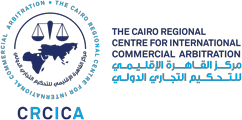Step-by-Step Guide under CRCICA Mediation Rules
- Any party may file a written request for mediation, without registration fees, under CRCICA Mediation Rules (the Rules) that indicates:
- The names and the contact details of the parties;
- Whether mediation is initiated under a mediation clause or through an invitation from one party to the other to mediate under CRCICA Mediation Rules;
- Identification of the legal instrument under which the dispute has arisen. In the absence of such, a brief description of the relevant legal relationship that has given rise to the dispute
- A brief description of the dispute and the claims;
- Optional: a suggestion as to the mediator’s professional background and experience (Article 4 of the Rules).
- CRCICA will circulate the request for mediation to the other party (parties).
- The other party should respond within 15 days or within any other time frame indicated in the request for mediation (Article 3(3) of the Rules)
- If a party accepts mediation, mediation will be deemed to have commenced on that day (Article 3(4) of the Rules) This is an important date for multi-tiered dispute resolution clauses or in cases where the referral to mediation is mandated by law or any other applicable instrument.
- If a party rejects mediation, mediation will not commence.
- The default rule is one mediator unless the parties agree otherwise (Article 6(3) of the Rules).
- The parties can select the mediator by:
- Joint designation within 14 days from the date of commencement (Article 6(1)&(3) of the Rules); or
- Agreeing on a designating mechanism (Article 6(1) of the Rules).
- CRCICA can select the mediator if the parties do not agree either on the mediator within the prescribed time limit or the designating mechanism (Article 6(2) of the Rules).
- Nominated mediators must provide CRCICA with a written statement of impartiality and independence within 7 days of nomination, which CRCICA will circulate promptly to the parties.
- The parties then have 7 days to object to the mediator’s nomination. In case of objection, CRCICA will replace the mediator (Article 7(1) of the Rules).
- CRCICA will request the deposit of an advance on the Costs upon commencement of the mediation and may request subsequently the payment of supplementary deposits (Article 17(1) of the Rules)
- The parties can attend themselves or be represented so long as the representative has authority to settle (Article 5 of the Rules)
- Mediation sessions can take place on one day or over a series of days as agreed by the mediator and the parties (Article 8(8) of the Rules)
- The mediator will:
- Explain the mediation process to the parties (Article 8(1) of the Rules);
- Design the process in consultation with them (Article 8(3) of the Rules); and
- Request the submission of documents and case memorials (Article 8(6) of the Rules)
- The mediator can conduct joint and/or private meetings with the parties and/or their representatives (Article 8(5) of the Rules)
- The parties can ask the mediator for non-binding recommendations for settlement, with the mediator remaining free to declining making recommendations (Article 8(7) of the Rules).
- In case of failure to reach a settlement, the mediator may adjourn the mediation in order to allow the parties to consider specific proposals or get more information that maybe conducive to settlement; the mediation will then reconvene with the agreement of the parties (Article 9(2) of the Rules).
- Mediation shall terminate by:
- The conclusion of the settlement agreement;
- The withdrawal of either party; or
- The mediator’s determination that settlement cannot be reached (Article 9(1) of the Rules).
- Upon termination of the mediation, CRCICA will render an accounting to the parties of deposits received and shall return the balance, if any, to the parties (Article 17(1) of the Rules).
- CRCICA can request the mediator to suspend or terminate the process if the required payments are not made timely (Article 17(3) of the Rules).

